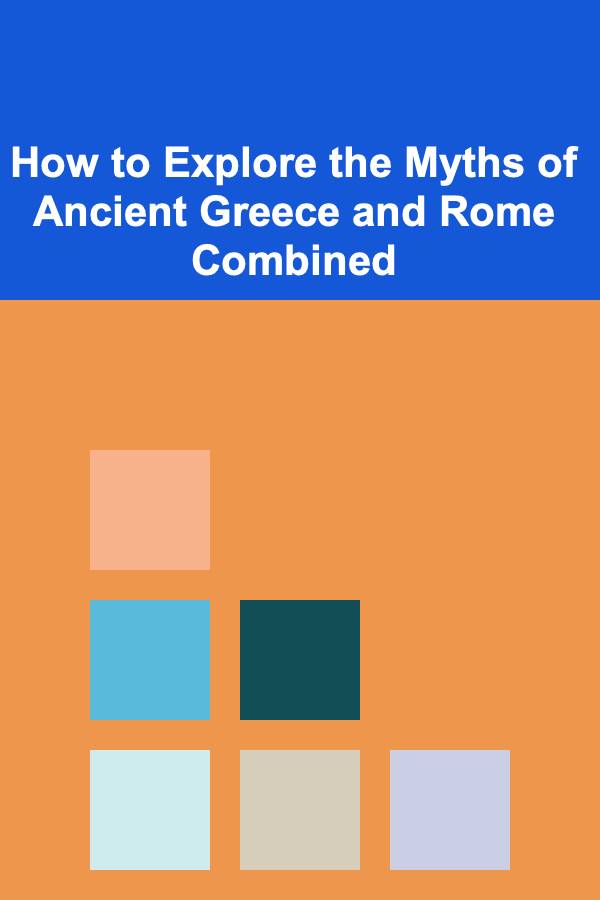
How to Explore the Myths of Ancient Greece and Rome Combined
ebook include PDF & Audio bundle (Micro Guide)
$12.99$8.99
Limited Time Offer! Order within the next:

Ancient Greece and Rome are two civilizations that have shaped much of Western thought, culture, and art. These ancient societies gave birth to incredible works of literature, philosophy, and art, many of which continue to influence modern thought. One of the most enduring legacies of these civilizations is their mythology --- a vast, rich collection of stories about gods, heroes, monsters, and the forces of nature.
While the myths of ancient Greece and Rome share many similarities, they also exhibit unique features. The Greek myths laid the foundation for Roman mythology, but the Romans adapted and altered many of the stories to fit their own cultural context. As a result, exploring the myths of Greece and Rome together can offer fascinating insights into the evolution of religious and cultural beliefs over time.
In this article, we will explore how to delve into the myths of both ancient Greece and Rome in a way that acknowledges their shared heritage while also appreciating their distinctive qualities. We will examine key gods, heroes, and myths, compare Greek and Roman versions of the same stories, and discuss the broader significance of mythology in these civilizations.
Understanding the Roots: Greek Mythology
Greek mythology is the foundation of Western mythology. The stories of gods and heroes from ancient Greece have had a profound influence on literature, art, and culture. The most famous of these stories were told in the epic poems of Homer, such as The Iliad and The Odyssey. These works set the stage for later myths, which were passed down through generations and became integral to Greek culture.
Greek myths often focus on the lives of gods and heroes. The gods were believed to reside on Mount Olympus, the highest mountain in Greece, where they ruled over various aspects of the world. These gods were not omnipotent or omniscient; rather, they were human-like in their desires, emotions, and flaws. This made them relatable to the people of ancient Greece, who saw them as reflections of their own nature.
Some of the most important gods in Greek mythology include:
- Zeus, the king of the gods, who ruled over the sky and thunder.
- Hera, the queen of the gods and goddess of marriage and childbirth.
- Poseidon, the god of the sea.
- Athena, the goddess of wisdom and war.
- Apollo, the god of the sun, music, and prophecy.
- Artemis, the goddess of the hunt and the moon.
The Greek myths are also populated by a host of legendary heroes, such as Heracles , Perseus , Theseus , and Achilles. These figures often performed great feats, battling monsters and facing trials that tested their strength, courage, and wisdom. The stories of these heroes serve as moral lessons and reflections on the human condition.
Key Greek Myths
Greek mythology is filled with memorable stories, some of which are more widely known than others. Here are a few key myths that are essential to understanding the Greek mythological tradition:
- The Creation Myth: The earliest Greek myth begins with Chaos, the void from which all things emerged. From Chaos came Gaia (the Earth), Uranus (the sky), and other primordial beings. Over time, the gods and their domains were established, and the world took shape.
- The Trojan War : Perhaps the most famous Greek myth, the Trojan War was fought between the Greeks and the Trojans after Paris of Troy kidnapped Helen, the wife of the Greek king Menelaus. This conflict, which lasted for ten years, was immortalized in Homer's The Iliad and The Odyssey.
- The Labors of Heracles: Heracles, known for his immense strength, was tasked with completing twelve impossible labors as punishment for killing his wife and children in a fit of madness. His journey is one of the most celebrated stories of heroism in Greek mythology.
The Romans: Adapting Greek Myths
Roman mythology, though heavily influenced by Greek mythology, had its own distinct character. The Romans adopted many of the Greek gods and myths but gave them different names and often altered the details to reflect Roman values and priorities. While the Greeks focused on individual heroism, emotion, and the divine, the Romans were more concerned with concepts such as duty, virtue, and the power of the state.
The Roman gods often reflected the values that were important to Roman society. For example, Jupiter , the king of the gods in Roman mythology, was modeled after Zeus but was also a symbol of Roman power and governance. Venus, the Roman goddess of love and beauty, was similar to the Greek goddess Aphrodite but was also associated with the founding of Rome itself, as she was considered the mother of the Roman people through her son Aeneas.
Key Roman Gods and Figures
Roman mythology includes many gods and figures that are familiar from Greek mythology but under different names. Some of the most important include:
- Jupiter (Zeus in Greek mythology) -- the king of the gods, ruler of the sky.
- Juno (Hera) -- the goddess of marriage and queen of the gods.
- Neptune (Poseidon) -- the god of the sea.
- Minerva (Athena) -- the goddess of wisdom and war.
- Apollo (same in Greek mythology) -- the god of the sun, music, and prophecy.
- Diana (Artemis) -- the goddess of the hunt and the moon.
The Romans also had their own set of legendary heroes, such as Aeneas , the Trojan prince who became the founder of Rome, and Romulus and Remus, the legendary twin brothers who were said to have founded the city of Rome.
Roman Myths: Key Stories
The Romans created many of their own myths, some of which are intertwined with their national identity. Here are a few key Roman myths:
- The Aeneid: This epic poem, written by the Roman poet Virgil, tells the story of Aeneas's journey from Troy to Italy, where he would eventually become the ancestor of the Roman people. The Aeneid blends Greek mythology with Roman ideals, emphasizing duty, sacrifice, and the founding of Rome as a divinely ordained mission.
- The Rape of the Sabine Women: This myth tells the story of how Romulus and his followers, lacking women to marry, abducted women from a neighboring tribe, the Sabines. The women eventually reconciled the two groups, leading to the unification of the Romans and Sabines.
- The Foundation of Rome: The story of Romulus and Remus, the twin brothers raised by a she-wolf, is one of the most famous founding myths of Rome. Romulus eventually killed Remus and became the first ruler of Rome, embodying the themes of conflict and survival that were central to Roman identity.
Comparing Greek and Roman Myths
While the Greek and Roman mythologies share many similarities, there are important differences in their tone, themes, and values. Below are some key areas in which the two mythological traditions diverge:
Gods and Their Roles
Greek gods were often depicted as flawed, emotional, and unpredictable, reflecting the human condition. They were not always benevolent or just, and their actions often had consequences for both mortals and other gods. Roman gods, on the other hand, were more often portrayed as symbols of Roman ideals, such as order, duty, and power. The Roman gods were still human-like in many ways, but they were often seen as more distant and less emotionally driven than their Greek counterparts.
Heroism and Virtue
In Greek mythology, heroes like Heracles, Achilles, and Odysseus often struggled with personal flaws or moral dilemmas. Greek heroes were defined by their strength, courage, and intellect, but their stories were also filled with moments of failure, hubris, and divine punishment. Roman heroes, such as Aeneas, were more concerned with duty and the welfare of the state. Roman heroism was often linked to concepts of pietas (duty), virtus (virtue), and the preservation of the Roman Empire.
The Role of Women
Women in Greek mythology were often powerful but also portrayed as vulnerable and subject to the whims of the gods. Figures like Athena, Artemis, and Hera were strong, but other myths tell of women who suffered at the hands of gods or men, such as Medusa, Helen of Troy, and Penelope. Roman mythology also featured powerful women, but they were often more closely tied to the founding and preservation of Rome. For example, the Roman goddess Vesta represented the hearth and home, and women like Lucretia played crucial roles in the founding of the Republic.
How to Explore Greek and Roman Myths
Exploring the myths of ancient Greece and Rome can be a deeply enriching experience. Here are some ways to engage with these stories:
- Read the Primary Texts : The best way to explore Greek and Roman mythology is to read the original texts, such as Homer's The Iliad and The Odyssey , Virgil's Aeneid , and Ovid's Metamorphoses. These works provide direct insight into the beliefs and values of ancient civilizations.
- Compare Different Versions of the Myths : By examining both Greek and Roman versions of the same myths, you can gain a deeper understanding of how these two cultures influenced one another. For example, compare the Greek myth of the Trojan War with Virgil's Roman version in The Aeneid.
- Study the Art and Architecture: Greek and Roman myths were frequently depicted in art, including sculpture, pottery, and painting. Studying these works can give you a visual understanding of how the myths were perceived by ancient people.
- Explore Modern Interpretations : Many modern authors, poets, and artists have drawn inspiration from Greek and Roman myths. Works such as The Silence of the Girls by Pat Barker or the Percy Jackson series by Rick Riordan bring these ancient stories to contemporary audiences.
- Visit Museums and Archaeological Sites: Museums with collections of ancient Greek and Roman artifacts, such as the British Museum or the Louvre, often feature depictions of mythological scenes. Visiting these collections can provide a tangible connection to the myths and the cultures that created them.
Conclusion
Exploring the myths of ancient Greece and Rome offers a unique opportunity to understand the values, beliefs, and artistic traditions of two of the most influential civilizations in human history. By comparing Greek and Roman myths, we can appreciate both the similarities and differences between these cultures, and gain insight into how mythology shaped the development of Western civilization.

How to Craft a Resume That Gets Noticed
Read More
How to Create a Pet Supply Station for Easy Access
Read More
How to Make Your Home More Energy-Efficient and Save Money
Read More
How to Renovate Your Home to Improve Storage Solutions
Read More
How to Use Your Travel Skills to Teach Online Classes
Read More
How To Pick the Perfect Romance Novel for Your Mood
Read MoreOther Products

How to Craft a Resume That Gets Noticed
Read More
How to Create a Pet Supply Station for Easy Access
Read More
How to Make Your Home More Energy-Efficient and Save Money
Read More
How to Renovate Your Home to Improve Storage Solutions
Read More
How to Use Your Travel Skills to Teach Online Classes
Read More